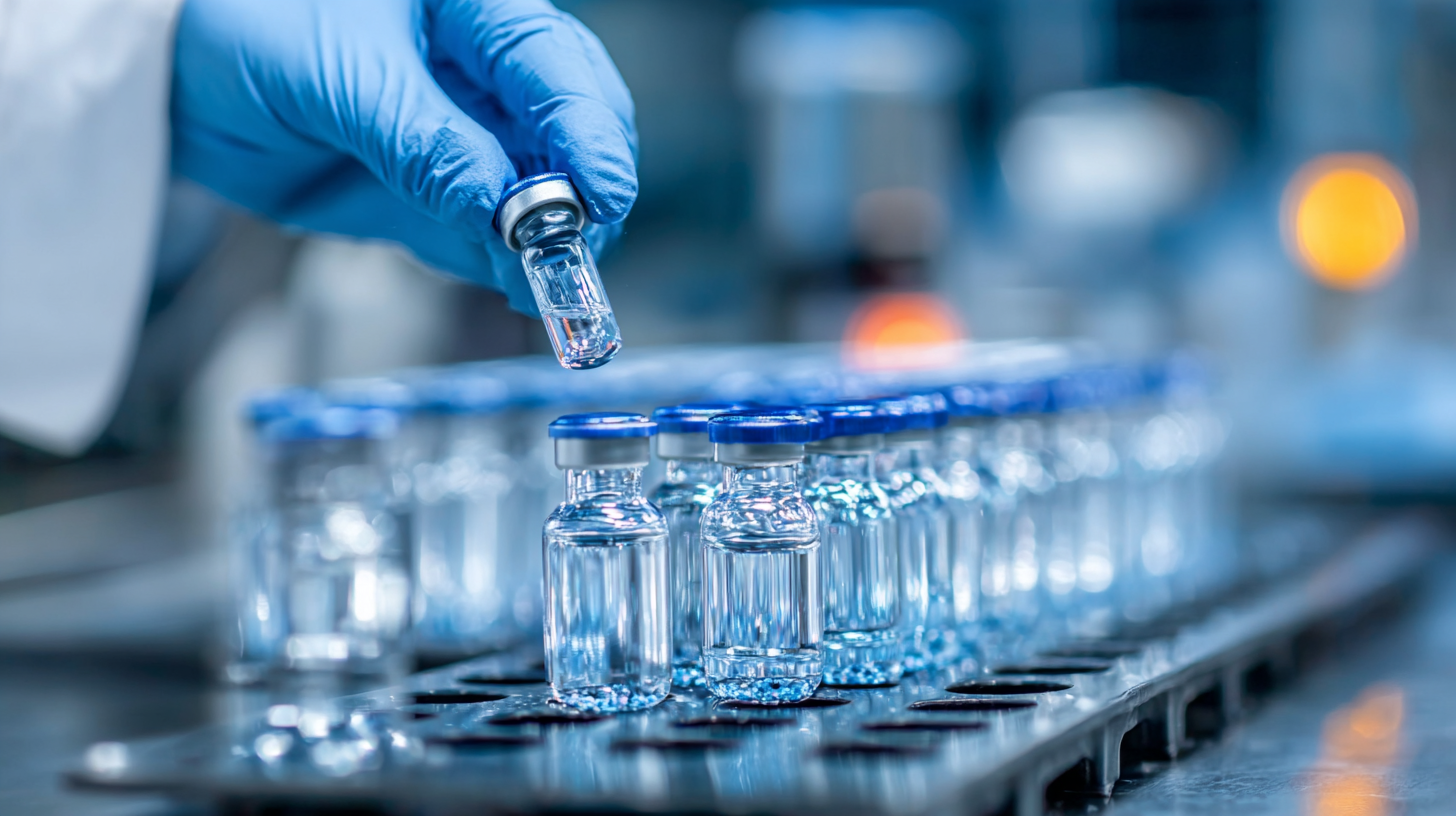
Ultimate Guide to Sourcing the Best Peptide Api Manufacturing for Your Business Needs
In today's competitive pharmaceutical landscape, the significance of Peptide API manufacturing has surged, propelled by the increasing demand for innovative therapeutic solutions. According to a report by Grand View Research, the global peptide therapeutics market is expected to reach USD 12.2 billion by 2025, growing at a CAGR of 9.1%. This trend underscores the critical role of sourcing high-quality peptide APIs, which serve as essential building blocks in drug development. However, navigating the complexities of Peptide API manufacturing requires a comprehensive understanding of sourcing strategies, quality assurance, and supplier capabilities.

As businesses strive to meet regulatory standards and expedite their time-to-market, identifying the best manufacturing partners becomes imperative. This ultimate guide aims to equip you with the knowledge and tools necessary to optimize your sourcing efforts in the peptides sector, ensuring your business stays ahead of the curve in an ever-evolving market.
Understanding the Importance of Quality Peptide API in Your Business
In the competitive landscape of pharmaceuticals and biotechnology, the quality of peptide Active Pharmaceutical Ingredients (APIs) is paramount. High-quality peptide APIs not only ensure the efficacy of therapeutic products but also play a crucial role in patient safety. Poorly synthesized peptides can lead to ineffective treatments and increased risk of side effects, which may ultimately harm a company's reputation and financial standing. Thus, investing in quality peptide APIs is not merely an option; it is a necessity for businesses aiming to excel in the market.

Moreover, the sourcing process for peptide APIs significantly influences the overall quality of the end product. Partnering with reputable manufacturers who adhere to stringent quality control standards and Good Manufacturing Practices (GMP) can mitigate risks associated with contamination and subpar product performance. It’s essential to evaluate potential manufacturers based on their technological capabilities, regulatory compliance, and previous client feedback. By prioritizing quality in the sourcing of peptide APIs, businesses can enhance their product development processes, ensure regulatory compliance, and ultimately, provide safer and more effective therapeutics to meet market demands.
Key Factors to Consider When Choosing a Peptide API Manufacturer
When selecting a peptide active pharmaceutical ingredient (API) manufacturer, it's crucial to evaluate several key factors that can significantly impact your product's success. First and foremost, the manufacturer's compliance with Good Manufacturing Practices (GMP) is non-negotiable. According to a recent report by Freedonia Group, the global peptide therapeutics market is expected to reach $52.5 billion by 2025, underscoring the need for rigorous compliance in a competitive landscape where quality and safety are paramount.

Additionally, consider the manufacturer's experience and expertise in peptide synthesis. As highlighted in the 2022 PharmaReport, companies with over 10 years of experience in peptide APIs demonstrate an impressive 40% higher success rate in meeting clinical trial milestones compared to newer entrants. The ability to scale production while maintaining quality and consistency cannot be overlooked; for instance, a manufacturer with robust production capabilities can ensure timely delivery, which is crucial for meeting regulatory timelines and competitive market demands.
Lastly, evaluating the manufacturer's technological capabilities can provide insights into their efficiency and innovation. A recent study indicated that manufacturers leveraging advanced automated systems can reduce production times by up to 30%, leading to faster time-to-market. This factor is increasingly important as the pharmaceutical industry shifts towards personalized medicine and demands more flexible manufacturing solutions.
Evaluating Manufacturing Capabilities and Compliance Standards
When sourcing the best peptide API manufacturing for your business, evaluating the manufacturing capabilities and compliance standards is essential for ensuring product quality and safety. Start by researching potential manufacturers to understand their production processes and facility certifications. Look for facilities that have been certified by relevant regulatory bodies, such as FDA, EMA, or other local authorities. This certification demonstrates that the manufacturer adheres to stringent industry standards, thus minimizing the risk of contamination and ensuring batch consistency.
Tip: Consider requesting documentation of their Good Manufacturing Practices (GMP) compliance. This documents their operational procedures and quality control measures, providing insight into their commitment to maintaining high standards.
Further, assess the manufacturer’s ability to scale production according to your needs. Confidently inquire about their capabilities in handling diverse peptide sequences, customizations, and potential challenges in scaling up. A responsive and communicative manufacturer will be able to quickly address your unique requirements and navigate any technical hurdles that arise during production.
Tip: During your evaluation, arrange a facility tour if possible. This allows you to observe their operations firsthand and understand their commitment to quality assurance.
Assessing Supplier Reputation and Customer Support for Peptide API
When it comes to sourcing peptide API manufacturing, assessing supplier reputation and customer support is paramount. A reputable supplier should have a proven track record of delivering high-quality products while adhering to industry regulations. To gauge their reputation, look for client testimonials, case studies, and any certifications they hold. Engaging directly with current or past customers can provide invaluable insights into their experiences and the reliability of the supplier.
Equally important is the level of customer support offered by the manufacturer. Effective communication and responsiveness can greatly impact your overall experience. A supplier inclined toward customer-centric values will not only address your inquiries promptly but also provide guidance throughout the purchasing process. Consider asking potential suppliers for their communication protocols, turnaround times for queries, and how they handle technical support, as these factors can reveal much about their commitment to customer satisfaction.
Ultimate Guide to Sourcing the Best Peptide Api Manufacturing for Your Business Needs - Assessing Supplier Reputation and Customer Support for Peptide API
| Supplier Type | Reputation Score | Customer Support Rating | Quality Compliance | Lead Time (days) |
|---|---|---|---|---|
| Domestic Manufacturer | 9.2 | 4.8 | ISO 9001, GMP | 30 |
| International Supplier | 8.5 | 4.5 | ISO 13485, GMP | 45 |
| Custom Peptide Service | 9.5 | 4.9 | ISO 9001, cGMP | 20 |
| Bulk Supplier | 8.0 | 4.0 | GMP | 60 |
| Research Institution | 9.0 | 4.7 | ISO 9001 | 25 |
Cost Considerations: Balancing Quality and Affordability in Peptide Sourcing
When sourcing peptide APIs (Active Pharmaceutical Ingredients), cost considerations are critical. Balancing quality and affordability is essential for maintaining the integrity of your product while vying competitively in the market. Quality should never be compromised for the sake of lower prices; however, there are ways to ensure that you can enjoy both without significantly sacrificing one for the other.
Tip 1: Conduct thorough research on potential manufacturers. Look into their certifications, track record, and customer reviews. A supplier with a strong reputation may charge more, but the assurance of quality could save you from costly recalls or compliance issues down the line.
Tip 2: Leverage bulk purchasing and long-term contracts. Often, suppliers are willing to offer discounts for larger orders or extended agreements, ensuring that you not only secure a better price but also establish a stable supply chain, aiding in budget forecasts.
Tip 3: Always request samples before committing to larger orders. This allows you to assess the quality of the peptides without a significant upfront investment, reducing financial risk while helping you identify the best balance between quality and cost.
